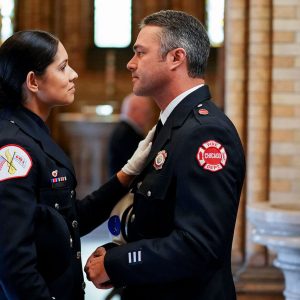Chicago Fire fans are bracing themselves for yet another exit that feels like a slap in the face. With Darren Ritter, a fan-favourite firefighter, confirmed to be leaving Firehouse 51 ahead of Season 14, viewers can’t help but feel frustrated with a long-standing pattern within the show. While exits are a natural part of any series, Ritter’s departure highlights an ongoing issue with Chicago Fire’s treatment of secondary characters: a trend that desperately needs to stop.
The Rise of Ritter: A Hidden Gem of Firehouse 51
When Ritter first joined Chicago Fire, he wasn’t supposed to be a central character. His quiet confidence, vulnerability, and genuine spirit quickly earned him a dedicated fanbase. Unlike the veteran firefighters who dominate the narrative, Ritter represented the new generation of first responders, struggling to prove himself while building meaningful relationships within the team. His close friendships with Gallo and Violet added richness to the ensemble cast, providing emotional depth that many fans were eager to see evolve.
From the beginning, it was clear that Ritter had a lot of untapped potential. He wasn’t just a secondary character; he had the makings of a future leader. Fans were excited to see how his character would grow, whether it was through his personal life, including his future marriage plans, or his development as a firefighter.
Why Ritter’s Departure Feels Like a Mistake
Ritter’s departure feels particularly frustrating because, just when the show was beginning to fully explore his character, NBC and the show’s producers decided to pull the plug. The news of his exit marks yet another instance of Chicago Fire sidelining promising characters right when they were poised for a deeper storyline.
This trend is all too familiar to long-time fans of the series. Over the years, we’ve seen characters like Otis, Mills, and Kidd’s friend Foster leave just as their arcs seemed to be gaining momentum. Their exits were not only disappointing but also left fans feeling disconnected from the show. Chicago Fire has repeatedly demonstrated a lack of commitment to developing side characters, opting instead for shocking exits that rarely come with the satisfying conclusions they deserve.
A Pattern of Underappreciated Talent
Ritter is the latest in a long line of characters who have been pushed aside for reasons that are often tied to behind-the-scenes issues rather than creative ones. Whether it’s budget cuts, contract disputes, or a misguided focus on other, more prominent characters, the show has failed to give certain secondary players the attention they deserve. For Ritter, this means leaving Firehouse 51 without the resolution his character arc needed—he won’t get the opportunity to explore his potential as a leader, a mentor, or even to experience a fulfilling personal life.
This disregard for character development undermines the overall storytelling. Chicago Fire is at its best when it focuses on the depth of its team. The interwoven relationships and personal struggles of the firefighters are what make the show emotionally gripping. By sidelining characters like Ritter, the show risks alienating its fans, who invest emotionally in the team’s dynamics.
The Need for Change
At this point, it’s clear that the trend of prematurely writing out beloved characters must stop. Chicago Fire thrives on its ensemble cast, and losing characters like Ritter without fully exploring their potential weakens the show. Instead of focusing on shocking exits or simply cutting costs, the writers and producers should be thinking about how to enrich the series with long-term character arcs that reward loyal fans.
Ritter’s departure signals a missed opportunity. He was not just a background player; he was a symbol of hope, growth, and renewal in Firehouse 51. His bond with Gallo and Violet had the potential to evolve into something deeper, shedding light on the personal journeys that go hand in hand with being a first responder.
What’s Next for Chicago Fire?
As we approach Season 14, fans are left to wonder if Chicago Fire will continue down this path of underusing its talented cast. If the show truly values its loyal viewers, it’s time to change course. Ritter’s exit is a frustrating reminder that it’s not just about shocking twists—it’s about developing characters who make the show what it is. The departure of characters like Ritter needs to be handled with care, offering satisfying resolutions and honoring the contributions they made to the series.
Without the proper focus on character arcs, Chicago Fire risks becoming just another procedural drama rather than the emotionally invested series fans have come to love. Let’s hope that Season 14 marks a turning point, where all characters—big and small—finally get the stories they deserve.
Ritter’s exit might be inevitable, but it’s time for Chicago Fire to break the cycle and give its characters the depth and respect they deserve.





